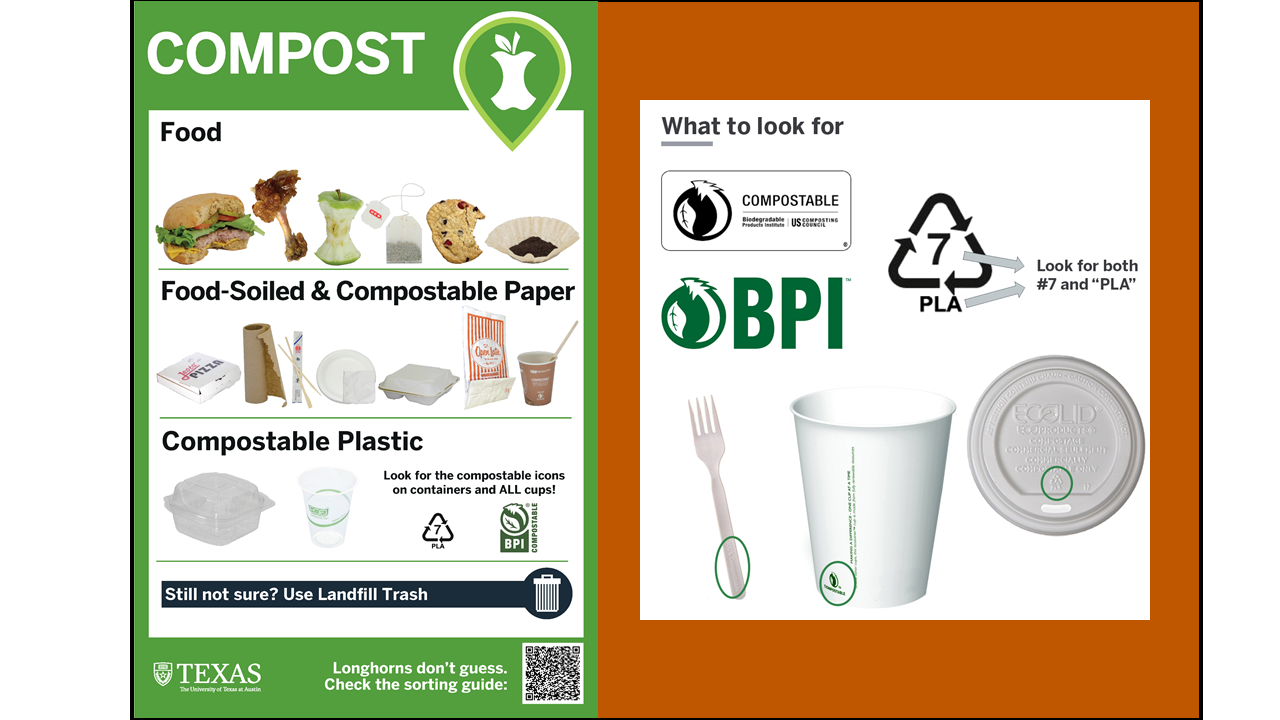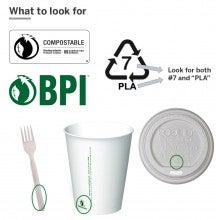UT is carefully and strategically providing compost collection to limit contamination. UT accepts recently alive plant and animal-based materials such as:
- Animal products: including food scraps such as meat, dairy, and bones
- Plant products*: including fruits and vegetables, as well as food-soiled paper pizza boxes, napkins, paper towels, wood stirrers, and chopsticks
*Compostable plant-based plastics will be identifiable by a symbol such as those shown in the photo below.

Downloadable files of UT waste signage
Why Compost
Composting is part of reducing the overall waste stream from the UT campus. In fact, Resource Recovery waste audits consistently find that 40-45% of material leaving campus is compostable. This means that composting is a necessary strategy to help us reach zero waste. Organic material decomposing anaerobically in landfills is the largest anthropogenic source of U.S. methane (a greenhouse gas 23 times stronger than CO2). The University community values composting because it reduces our carbon impact and is an important way for us to contribute to a greener economy by converting plant and animal-based materials into a product that is useful for gardening, landscaping, and house plants.
Innovative chemistry developments continually advance the use of plant-based starches in the creation of product packaging and food service products. This helps make it possible to streamline diversion of food service waste.
How Composting Works
Tour Texas Disposal Systems, which receives UT compostable materials.
Compost Sorting Game
Test your knowledge of what goes in the compost bins on campus! Clicking on “Google Slides” will open the game online and allow for sharing. The Google Slides must be in presentation mode for the home game slide to work. There are three answer choices for each question corresponding to the three waste bins on campus: Landfill Trash, Compost, and Recycle.
Compost at Work
Where is composting offered on campus?
Campus composting includes restroom paper towels, breakrooms, participating food service locations, and at events. UT Farm Stand offers a drop-off bin at their farmers markets and CEC's Green Events also offers opportunities for student organization events.
How can I compost in my breakroom?
Learn more about becoming a Zero Waste Workplace Champion.
Can campus compost really accept meat and cheese if they aren't allowed in backyard composting?
Compostable material from UT goes to an industrial composting facility where temperatures get hot enough to breakdown materials like meat and cheese and also certified compostable packaging.
How can I tell if a cup or other packaging item is compostable?

Any items made from natural materials like paper products (made from tree wood) are compostable. Items like paper cups actually have a plastic liner which keeps that liquid from soaking into the paper. If the plastic content is made from a bio-based alternative that has been tested and proven to break down into inert components in an industrial composting facility, it will carry a symbol, such as BPI or PLA #7. Please note that compostable plastics are NOT recyclable. If you are planning a Zero Waste Event, our team is happy to provide assistance.
What are the top compost contaminants?
Contaminants are items that don't belong in the compost bin because they impact the cleanliness and quality of the materials. Resource Recovery waste audits have identified these problem materials: plastic bottles, glass, disposable gloves, paper cups, and flexible plastic such as wrappers. UT receives fines for contamination that can threaten the continuation of our program.
Can I put other compost in the restroom paper towel bins?
Restroom composting is for paper towels ONLY. If you look closely, you will notice that these bins do not have a bag lining the bin. This helps keep program costs lower since compostable liners are very expensive. Putting in food and other compostable materials will make the bins dirty.
Compost at Home
How can I compost materials generated at my home?
CEC’s Microfarm, located at Guadalupe & 51st, has a backyard compost system that accepts material from the UT community. Additionally, check out opportunities at UT Farm Stand’s farmers markets, CEC’s Green Events, and the many options supported by the City of Austin. Please note that different composting systems have different requirements; what is accepted in industrial compost collection, for example, is different than backyard composting.
What are other ways I can support recycling and composting in my neighborhood?
The City of Austin’s Zero Waste Block Leaders program offers engaged residents a way to share their knowledge with their neighbors.


